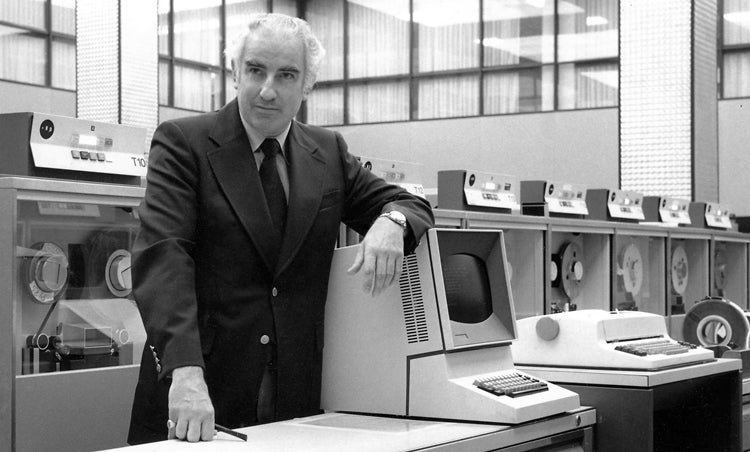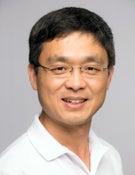The David R. Cheriton School of Computer Science is pleased to announce the inaugural Wes Graham Research Symposium & Computer Science Awards reception. The symposium takes its name from James Wesley (Wes) Graham, a humble visionary known as the father of computing at the University of Waterloo and an academic who devoted his career to making the magic of computers available to everyone.

Wes Graham in the Red Room, the space in the centre of the Mathematics and Computer Building that housed an IBM 360/75, the most powerful computer in Canada in 1967 — a computing machine that Graham was instrumental in acquiring.
In honour of his many contributions, the University of Waterloo established in 1994 the J.W. Graham Medal in Computing and Innovation, an award conferred annually to recognize individuals who have displayed leadership and have made innovative contributions to the University of Waterloo and the Canadian computer industry.
Wes Graham Research Symposium & Computer Science Awards
The celebration of Wes Graham’s legacy continues today with the inaugural Wes Graham Research Symposium & Computer Science Awards reception.
Starting in 2018, two computer science faculty members will be awarded a Wes Graham Research Fellowship to support research in artificial intelligence, data science and bioinformatics, including applications to healthcare and health informatics. As well, each year a Wes Graham Research Postdoctoral Fellowship will be awarded to an outstanding postdoctoral researcher.
Wes Graham Research Fellows
Professor
Bin
Ma
Inaugural
Graham
Research
Fellow,
2017–20

Professor
Jesse
Hoey
Inaugural
Graham
Research
Fellow,
2017–19

Professor Hoey currently holds $1.2M in research funding and has received $2.7M in research funds over his career. He has received awards from the American Sociological Association, Microsoft, AAAI and the International Association for Pattern Recognition for his innovative reearch.
Wes Graham Research Postdoctoral Fellow
Moojan
Ghafurian
Inaugural
Graham
Postdoctoral
Fellow

Her expertise includes designing and running behavioural experiments with human subjects and qualitative and quantitative research to understand human behaviour, emotions and biases. Her research explores computational models of how humans interact with computers to inform user-centred design that is applied to assistive technologies for the care of individuals with Alzheimer’s disease.
| Time | Event, description and room |
|---|---|
| 9:30 a.m. |
Morning Refreshments (DC 1302) |
| 9:40 a.m. |
Welcome
and
Opening
Remarks
(DC
1302) |
| 9:45 a.m. |
Greeting
from
the
Faculty
(DC
1302) |
| 9:50 a.m. |
A
Word
from
the
Trustees
(DC
1302) |
| 10:00 a.m. |
Building Assistive
Technologies
with Computational
Emotional
Intelligence
(DC
1302) Artificially intelligent assistive technologies promise to alleviate some of the increasing burden of care for persons with age-related cognitive disabilities, such as Alzheimer’s disease. However, despite tremendous progress, many attempts to develop and implement real-world applications have failed to become widely adopted. In this talk, I will argue that a key barrier to the adoption of these technologies is a lack of alignment, on a social and emotional level, between the technology and its users. I will then introduce a possible solution to this problem based in a social-psychological theory of culturally shared affective meanings as consistency heuristics that guide human action. These affective heuristics can be used to predict human reactions in practice, and therefore to produce more emotionally aligned artificially intelligent systems. I will give an introduction to this theory, and will discuss how affective reasoning could be used to create truly adaptive assistive technologies. |
| 11:00 a.m. |
Impatience
in
Humans’
Timing
Decisions:
The
Trade-off
between
Duration
Perception
and
Recall (DC
1302) Decisions about when to act are critical in many real-life situations. Examples include healthcare, safety and security situations, where acting early or late can result in substantial costs or losses. These types of decisions are dynamic and are mostly made under uncertainty. I propose impatience induced by delays as a bias affecting timing decisions and show that it can be successfully manipulated and moderated. I will discuss how impatience affects timing decisions, suggest a simple approach to manipulate and moderate it, and show that there are trade-offs between delay perception and delay recall. I will then discuss the implications of these findings for user-interface design. |
| 11:30 a.m |
Lunch (DC
1301
•
Fishbowl) Registration required to attend the lunch |
| 12:30 p.m. |
Decode
Cancer
and
Immunity-related
Proteins
through
Computation
and
Mass Spectrometry
(DC
1302) Our immune systems produce a special class of proteins called antibodies. Antibodies play a key role in the body’s defences to fight infection and diseases including cancer. The abnormality of the immune system may lead to autoimmune diseases such as rheumatoid arthritis. Engineered antibodies have also been used as drugs to provide targeted therapy for cancers. A critical need in the study of antibodies is to read out the order of amino acids of the protein (a.k.a protein sequencing). This used to be a labour-intensive task and not always successful. Recently, we developed a new method that combines computation with mass spectrometry to sequence the antibody proteins. Our method for the first time enabled high-throughput routine antibody protein sequencing. Equipped with this method, we are also exploring the application of the method in the detection of a specific blood cancer. |
| 1:30 p.m. |
2018
CS
Awards
Presentation and
Reception (DC
1301
•
Fishbowl) CS award recipients (PDF) |